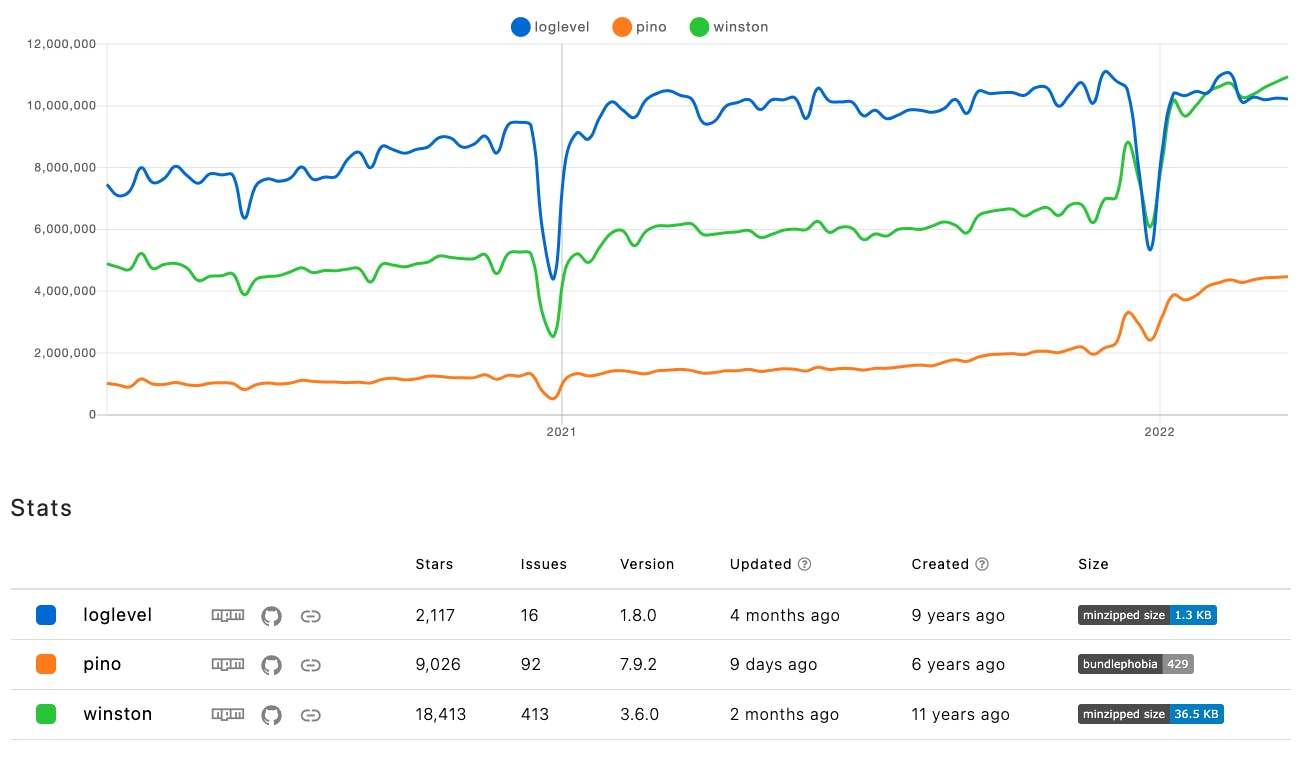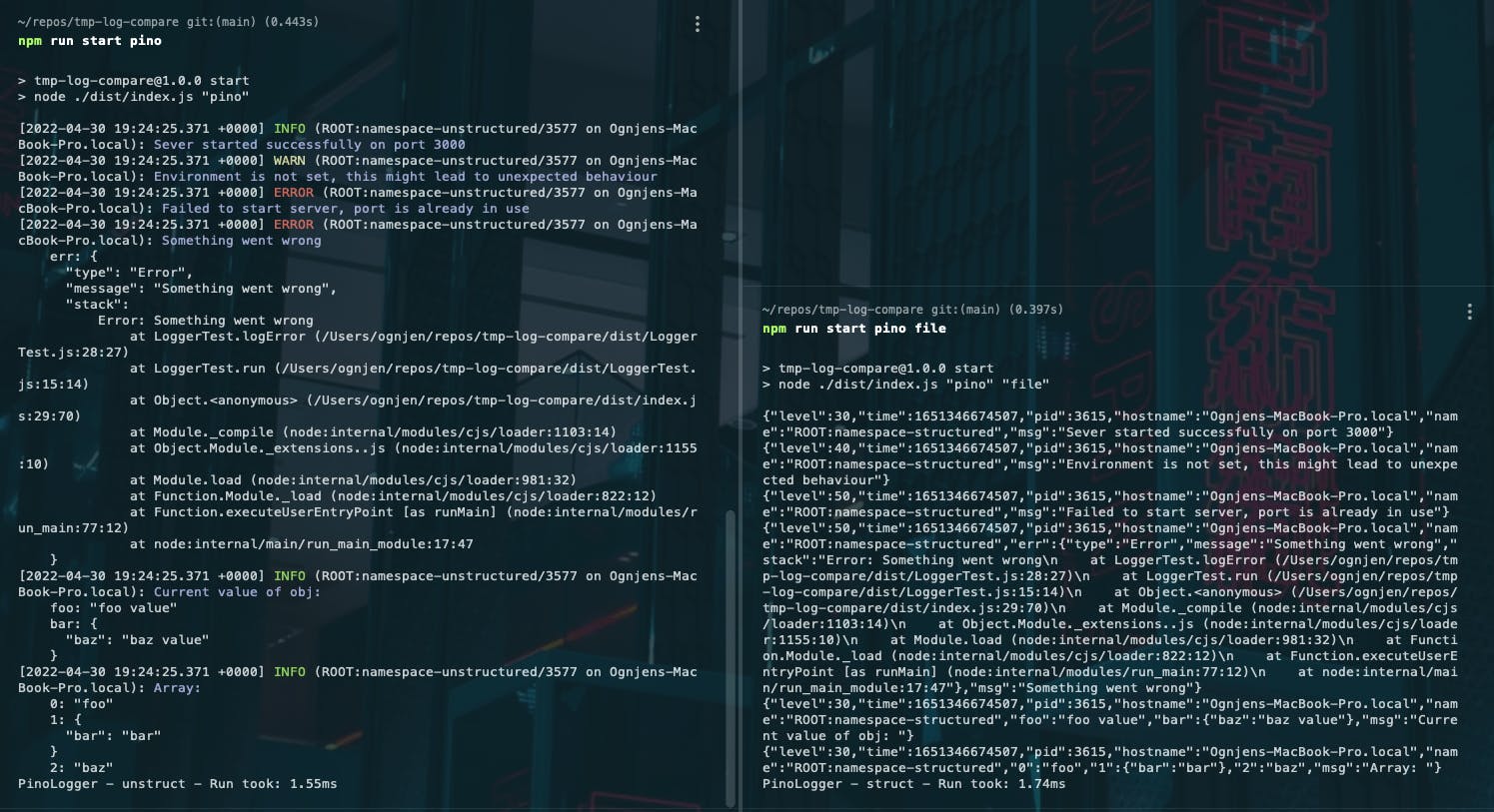
Photo by Dorelys Smits on Unsplash
What is the best Node.js logging library?
A comparison between the most popular npm packages
Sooner or later in the lifespan of your project, it will grow to a stage where the humble console.log will stop being adequate for your needs. Maybe you will need to store the logs in multiple places, separated by levels or just print them formatted in a human-readable way. Whatever the exact case may be, there are numerous logging libraries out there that can help you. Here is a short comparison of the best.
Available logging libraries
A quick google search on "node.js logging libraries", "best JS logging libraries", etc. Produced numerous results, eleven of which looked promising. In order to evaluate the state of these open sourced projects we looked at their popularity, project pulse (development and maintenance frequency), dependency & license checks, availability of types for Typescript and so on. The results of this evaluation are summarized in the following table
| Package | Pros | Cons |
| npm: loglevel | 0 dependencies, lightweight | - |
| npm: pino | fast, extensive docs, gaining popularity | - |
| npm: winston | popular, feature-rich | large package size |
| npm: npmlog | used by npm, lightweight | minimal, feature-lacking |
| npm: log | lightweight | minimal, feature-lacking |
| npm: ulog | feature-rich | not maintained, deps not maintained, no built-in types |
| npm: morgan | popular | not maintained, no built-in types |
| npm: bunyan | - | lot of open issues, no built-in types |
| npm: tracer | - | not maintained |
| npm: signale | customizable | not maintained |
| npm: log4js | - | lot of open issues |
Head to head comparison
Out of the packages from above it is only loglevel, pino and winston that seem to be universal and rich in features, while still being supported and maintained. We will compare them using available tools such as npm trends and npmcompare.

Since tools like npmcompare and npm trends essentially measure popularity of a package, they unsurprisingly favor winston which has been around for almost as long as npm itself. Also unsurprisingly, winston has the biggest number of unresolved issues among these three.
In contrast, results reveal that pino, the youngest one of the three, is most worked on, with a new version release every 9 days. It also has a quite strong high ratio of stars per download, which is an indication of a good user experience. And it is tiny in comparison to winston with 2.5KB min zipped
Finally, loglevel has the smallest community of the three, which is surprising given its number of downloads is equal to that of winston. This can be partially explained by the fact that there are several popular libraries that depend on it.
Playground
In order to compare them in practice a minimal testing setup was put in place. It can be found on log-lib-compare - CodeSandbox or cloned from obostjancic/log-lib-compare
NOTE: check README file for instructions on how to start the project
All three libraries were installed in a Typescript project and “wrapped” to implement a common interface. This then allowed a fair comparison between them as they were similarly configured. The following features were tested:
- log levels
- error logging
- object & array logging
- namespace support
- structured vs. pretty logging
- multi transport support
The results, as well as the observations made during development are listed below:
loglevel
It's README describes the project as:
“Minimal lightweight simple logging for JavaScript. loglevel replaces console.log() and friends with level-based logging and filtering, with none of console's downsides.”
loglevel is easy to get started with and integrate in a project, and it does fullfil on the promise it makes. However being minimal, it relies on plugins to get features like log formatting or remote storage. Unfortunately this plugin ecosystem is unmaintained and consists of only 4 officially supported plugins, none of which allow for structured logging or filesystem interaction.
 Unstructured logging (left) vs. structured (right) - Note that the formatting of the erorr in the right comes from the shell and not from the library itself.
Unstructured logging (left) vs. structured (right) - Note that the formatting of the erorr in the right comes from the shell and not from the library itself.
pino
Similar to loglevel, pino is easy to get started with. Unlike loglevel it comes with structured JSON logging by default. It also supports multiple transport which allow for a simultaneous outputs to console and log files. It has namespace support, as well as child loggers which can be then used to further specify logging scope. According to a very simple duration measurement it is fastest of the three, although it is not 5x faster than winston as it's README claims. When it comes to pretty print support it relies on a npm: pino-pretty package that prints out colored logs to the console. Last but not least, unlike the other 2 it has extensive and well organised documentation
 Unstructured logging (left) vs. structured (right)
Unstructured logging (left) vs. structured (right)
winston
winston has a very rich feature set that is comparable to pino. It also supports multiple transports, has child loggers, extensive formatting options etc. Additionally, it has a huge community that brings a lot of answered questions on Stack overflow. Where it falls short compared to pino is its ease of use. Seemingly simple tasks such as timestamp formatting require a lot of configuration. There is no namespace support, but it can be implemented with metadata. Pretty printing is supported and the colors are distinguishable colors between the log levels. The entire documentation is in the README file which makes it a bit hard to navigate considering the projects size and age.
 Unstructured logging (left) vs. structured (right)
Unstructured logging (left) vs. structured (right)
Conclusion
In case that you are on the lookout for a lightweight logger that can replace the console.log statements, then loglevel is worth a try. In all other cases where you require a mature logging library, take a look at pino and winston. Both are very capable logging libraries that come with "batteries included", so they will probably meet any criteria you have in mind. winston is the traditional solution while pino more modern, better maintained and provides a much better developer experience overall.

